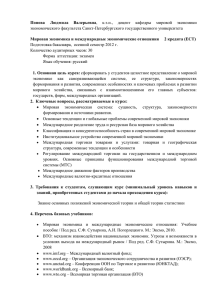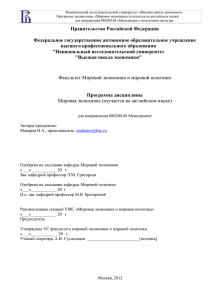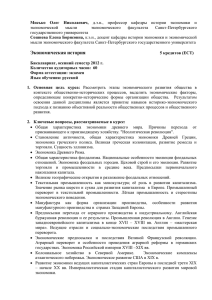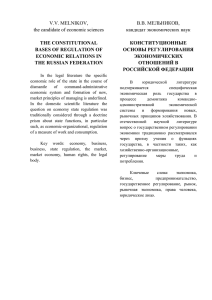(изучено на английском языке)
реклама
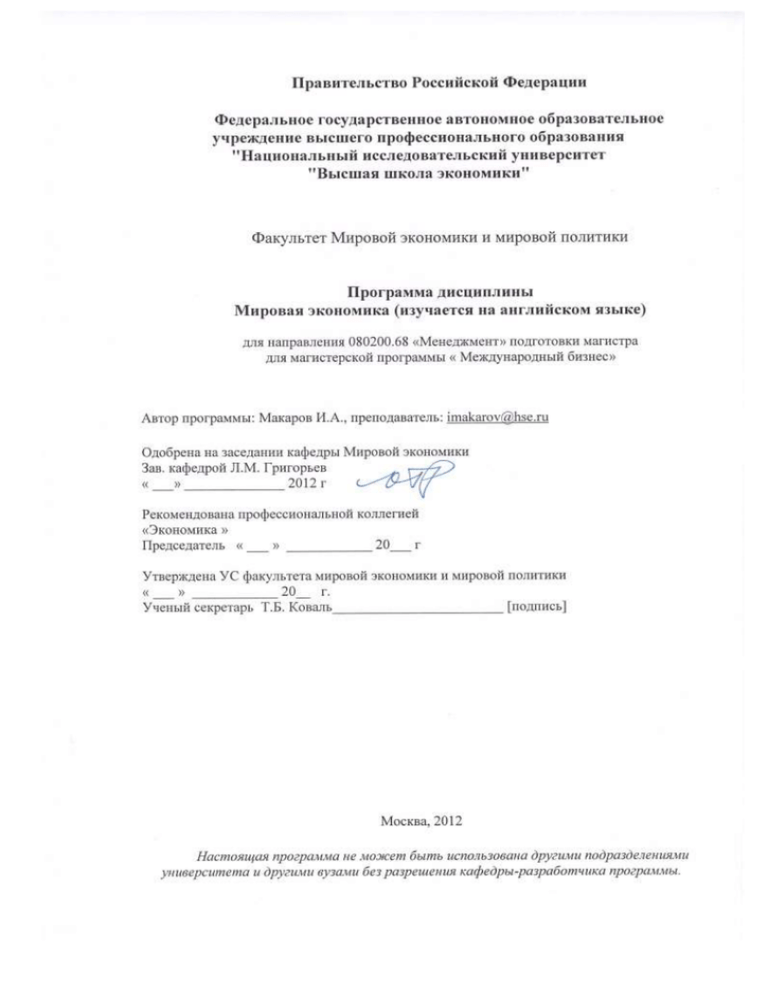
Национальный исследовательский университет «Высшая школа экономики» Программа дисциплины «Мировая экономика» (изучается на английском языке) для направления 080200.68 «Менеджмент» подготовки магистра Национальный исследовательский университет «Высшая школа экономики» Программа дисциплины «Мировая экономика» (изучается на английском языке) для направления 080200.68 «Менеджмент» подготовки магистра 1 Область применения и нормативные ссылки Настоящая программа учебной дисциплины устанавливает минимальные требования к знаниям и умениям студента и определяет содержание и виды учебных занятий и отчетности. Программа предназначена для преподавателей, ведущих данную дисциплину, учебных ассистентов и студентов, обучающихся по направлению 080200.68 «Менеджмент», изучающих дисциплину «Мировая экономика» Программа разработана в соответствии с: стандарт НИУ ВШЭ; Образовательной программой 080200.68 «Менеджмент» подготовки магистра; Рабочим учебным планом университета по направлению подготовки 080200.68 «Менеджмент», утвержденным в 2012 г. 2 Цели освоения дисциплины Цели освоения дисциплины «Мировая экономика»: - подготовка студентов к качественному и количественному анализу экономических проблем; - обзор ключевых проблем мировой экономики и основных факторов, определяющих развитие мировой экономики в исторической перспективе (ретроспективе); - установление связей между факторами и основными теориями, целями и методами экономической политики. 3 Компетенции обучающегося, формируемые в результате освоения дисциплины В результате освоения дисциплины студент должен: Знать основные тенденции развития мировой экономики, основные экономические законы, историю развития мировой экономики; Уметь анализировать источники научной информации по изучаемой проблематике, формулировать собственные суждения о процессах, происходящих на мировой экономической и политической арене. В результате освоения дисциплины студент осваивает следующие компетенции: Компетенция Способен учиться, приобретать новые знания, умения, в том числе в области, отличной от профессиональной Способен понимать и анализировать мировоззренческие, социально и личностно значимые проблемы и процессы, происходящие в обществе. Код по ФГОС/ НИУ СК- Б1 Дескрипторы – основные признаки освоения (показатели достижения результата) Формы и методы обучения, способствующие формированию и развитию компетенции Использует новые знания, Лекции умения, в том числе в области, отличной от профессиональной, а также и в профессиональной СЛК –Б6 Анализирует текущее состояние мировой экономики и политики, выделяет основных акторов, формулирует собственную позицию по изучаемым аспектам дисциплины Лекции 2 Национальный исследовательский университет «Высшая школа экономики» Программа дисциплины «Мировая экономика» (изучается на английском языке) для направления 080200.68 «Менеджмент» подготовки магистра 4 Место дисциплины в структуре образовательной программы Настоящая дисциплина относится к циклу гуманитарных и социально-экономических дисциплин. Она является одной из первых дисциплин, изучаемых студентами в рамках учебного плана, а потому является вводной. Основные положения дисциплины должны быть использованы в дальнейшем при изучении следующих дисциплин: International Trade International Marketing Global Political Economy and Interaction between Business and Politics World's Business Cultures and International Business Negotiations International Business Consulting Contemporary Issues in International Business Strategic Management of International Companies 5 Тематический план учебной дисциплины № 1 2 3 4 Аудиторные часы ПрактичеСемиЛекции ские занянары тия Всего часов Название раздела Introduction. History of the world economy. Globalization Resources in global economy. Natural resource and environmental problems International Trade International Financial system. Cycles and Crises. Institutions. ВСЕГО 108 Самостоятельная работа 4 23 4 23 4 4 23 23 16 0 0 92 6 Формы контроля знаний студентов Тип кон- Форма контроля троля ИтогоЗачет вый 1 * 1 год 2 3 Кафедра Параметры ** Мировой экономики Письменный зачет 4 6.1 Критерии оценки знаний, навыков Оценки за зачет выставляются по 10-ти балльной шкале. 6.2 Порядок формирования оценок по дисциплине Зачет проводится в письменной форме в виде развернутого ответа студентом на поставленный вопрос. Время, предоставляемое студентом для выполнения этого задания, составляет 30 минут. 3 Национальный исследовательский университет «Высшая школа экономики» Программа дисциплины «Мировая экономика» (изучается на английском языке) для направления 080200.68 «Менеджмент» подготовки магистра 7 Содержание дисциплины 1. Introduction. History of the world economy. Globalization Methodology of international economics. World economy and neoclassical economics. World economy and institutional economics. World economy and international relations. Dynamics of world development. Resources for economic growth. Factors of production and evolution of its use. Sectoral structure of world economy. Main stages of world economic development. The main features of World economy in Antiquity, in Medieval Ages, in Epoch of Great Geographical Discoveries, before the World War I, after the World War II, at the beginning of the 21 st century. The nature and impacts of globalization. When did it start? Readings (required readings are marked bold): 1. IMF World Economic Outlook, October 2000. Chapter 5. 2. Gilpin R. Global political economy: Understanding the International Economic Order Princeton University Press, 2001. Chapters 2, 3. 3. Maddison A. The World Economy. Vol. 1. A Millennial Perspective. Paris: OECD 2006. 4. Braudel F. Civilization and Capitalism, 15th–18th Centuries, 3 vols. London: Phoenix Press, 2002 [1979]. 5. Kolodko G. Truth, Errors, and Lies: Politics and Economics in a Volatile World. New York: Columbia University Press, 2011. 6. Clark G. A Farewell to Alms: A Brief Economic History of the World. Princeton University Press, 2008. 7. Stiglitz J. Globalization and Its Discontents. New York and London: W.W. Norton, 2001. 8. Bhagwati J. In Defense of Globalization. New York: Oxford University Press, 2004. 2. Resources in global economy. Natural resource and environmental problems Resources. Labour resources. Population growth and its difference in different countries. Demographic transition. International migration. Geography of international migration flows. Natural resources. Problem of their scarcity and uneven distribution. Environmental problems. Ozone layer depletion. Climate change and its economic impacts. Mitigation, adaptation and geoengineering. Kyoto protocol. Climate regulation beyond 2012. Water scarcity. Optimization of water consumption, water trade, technological innovations. Loss of biodiversity. Deforestation. Transnational pollution. Green growth. Readings (required readings are marked bold): 1. OECD. Environmental Outlook to 2050. The Consequences of Inaction. Paris: OECD Publishing, 2012. Executive Summary. 2. Stern N. et al. Stern Review: The Economics of Climate Change. London: HM Treasury, 2006. Executive Summary 3. Brown L. The New Geopolitics of Food // Foreign Policy, No. 3, 2011. 4. Makarov I. Double Dividend to Replace Global Altruism // Russia in Global Affairs, Vol. 8, No. 4, 2011. 5. Jagerskog A., Jonch Clausen T. et al. Feeding a Thirsty World – Challenges and Opportunities for a Water and Food Secure Future. Report Nr. 31. SIWI, Stockholm, 2012. 6. OECD. Towards the Green Growth. Paris: OECD Publishing, 2011. 7. Solow R. Sustainability: An Economist’s Perspective / in: Stavins R.N.. Economics of the Environment: Selected Readings. New York, London: W.W.Norton & Company, 2000. 8. Meadows D., Randers J., Meadows D. Limits to Growth: The 30-Year Update. White River Junction: Chelsea Green Publishing, 2004. 4 Национальный исследовательский университет «Высшая школа экономики» Программа дисциплины «Мировая экономика» (изучается на английском языке) для направления 080200.68 «Менеджмент» подготовки магистра 3. International Trade History and dynamics of international trade. Classical theories of international trade. Absolute and comparative advantage. Hecksher-Ohlin theory. New theories of international trade. Scale effect. Imperfect competition. Krugman theory. Competitive advantage. Role of the cities. Path dependence in international trade. New economic geography. Role of the state. Liberalism vs protectionism. Regulation of international trade. GATT and WTO. Russia in WTO Readings (required readings are marked bold): 1. Gilpin R. Global political economy: Understanding the International Economic Order Princeton University Press, 2001. Chapter 8. 2. Bougrine H. The World Trade Organization, free trade areas, and the distribution of wealth / in: O’Hara P.A. Global Political Economy and the Wealth of Nations. London, New York: Routledge, 2004. 3. Krugman P., Obstfeld M. International Economics: Theory and Policy. Boston: Pearson, 2006 [1998]. 4. Krugman P. Geography and Trade. London: MIT Press/Leuven UP, 1991. 5. Reinhardt E. How Rich Countries Got Rich and Why Poor Countries Stay Poor. London: Constable, 2007. 6. Trebilcock M.J., Howse R. The regulation of international trade. London and New York: Routledge, 2005. 7. Portansky A. Russia’s Accession to the WTO: External Implications // Russia in Global Affairs, Vol. 8, No. 2, 2011. 4. International Financial system. Cycles and Crises. Institutions. Structure of GDP. Savings, investment, consumption. Rate of savings and rate of investment. Financial market and their role. Types of financial markets. Capital market. FDI, portfolio, other investments. Role of FDI in world economy. TNC and its role. Financial globalization. Economic cycles and crises. Types and role of the cycles. Procyclical and anticyclical economic policy. Economic crisis of 2008-2009. Institutions and their role in economic system. Formal and informal institutions. The economic meaning of democracy, jural state, well-protected property rights. Corruption and bureaucracy as obstacles to economic development. Problems of institutional system in developing countries. Readings (required readings are marked bold): 1. Gilpin R. Global political economy: Understanding the International Economic Order Princeton University Press, 2001. Chapter 10. 2. Davies J. Transnational corporations: Dynamic structures, strategies, and processes / in: O’Hara P.A. Global Political Economy and the Wealth of Nations. London, New York: Routledge, 2004. 3. North D. Institutions // Journal of Economic Perspectives, Vol. 5, No. 1, 1991. 4. Krugman P. The Return of Depression Economics and the Crisis of 2008. New York, London: W.W. Norton, 2008. 5. Roubini N., Mihm S. Crisis Economics: A Crash Course in the Future of Finance. New York: The Penguin Press, 2010. 6. Fraser N. Reframing Justice in a Globalizing World // New Left Review, Vol. 36, No. 6, 2005. 7. Friedman T.L. The First Law of Petropolitics // Foreign Policy. May-June 2006. 8. North D. Understanding the Process of Economic Change. Princeton University Press, 2005. 9. De Soto H. The Other Path: The Economic Answer to Terrorism. New York: Basic Books, 2002. 5 Национальный исследовательский университет «Высшая школа экономики» Программа дисциплины «Мировая экономика» (изучается на английском языке) для направления 080200.68 «Менеджмент» подготовки магистра 8 Образовательные технологии Форма проведения занятий - лекции 9 Оценочные средства для текущего контроля и аттестации студента 9.1 Вопросы для оценки качества освоения дисциплины Примерный перечень вопросов к зачету по всему курсу или к каждому промежуточному и итоговому контролю для самопроверки студентов. 1. Methodology of international economics and international political economy. 2. Sectoral structure of world economy. 3. Main stages of world economic development. 4. Labour resources in world economy. Population growth and its difference in different countries. 5. International migration. Geography of international migration flows. 6. Natural resources in world economy. Problem of their scarcity and uneven distribution. 7. Environmental problems and world economy. 8. History and dynamics of international trade. 9. Classical theories of international trade. 10. New theories of international trade. 11. Regulation of international trade. GATT and WTO. 12. Meaning of rate of savings and rate of investment for national economies. 13. Role and types of financial markets. 14. Economic cycles and crises. 15. Institutions and their role in economic system. 10 Порядок формирования оценок по дисциплине Итоговая оценка складывается из оценки на зачете О = Озач где О – итоговая оценка по курсу, Озач – оценка за ответ на зачете. 11 Учебно-методическое и информационное обеспечение дисциплины 11.1 Базовый учебник Базовый учебник отсутствует 11.2 Основная литература: 1. Bougrine H. The World Trade Organization, free trade areas, and the distribution of wealth / in: O’Hara P.A. Global Political Economy and the Wealth of Nations. London, New York: Routledge, 2004. 2. Davies J. Transnational corporations: Dynamic structures, strategies, and processes / in: O’Hara P.A. Global Political Economy and the Wealth of Nations. London, New York: Routledge, 2004. 3. Gilpin R. Global political economy: Understanding the International Economic Order Princeton University Press, 2001. 4. IMF World Economic Outlook, October 2000. 5. North D. Institutions // Journal of Economic Perspectives, Vol. 5, No. 1, 1991. 6 Национальный исследовательский университет «Высшая школа экономики» Программа дисциплины «Мировая экономика» (изучается на английском языке) для направления 080200.68 «Менеджмент» подготовки магистра 6. OECD. Environmental Outlook to 2050. The Consequences of Inaction. Paris: OECD Publishing, 2012. Executive Summary. 7. Stern N. et al. Stern Review: The Economics of Climate Change. London: HM Treasury, 2006. Executive Summary 11.3 Дополнительная литература 1. Bhagwati J. In Defense of Globalization. New York: Oxford University Press, 2004. 2. Braudel F. Civilization and Capitalism, 15th–18th Centuries, 3 vols. London: Phoenix Press, 2002 [1979]. 3. Brown L. The New Geopolitics of Food // Foreign Policy, No. 3, 2011. 4. Clark G. A Farewell to Alms: A Brief Economic History of the World. Princeton University Press, 2008. 5. De Soto H. The Other Path: The Economic Answer to Terrorism. New York: Basic Books, 2002. 6. Fraser N. Reframing Justice in a Globalizing World // New Left Review, Vol. 36, No. 6, 2005. 7. Friedman T.L. The First Law of Petropolitics // Foreign Policy. May-June 2006. 8. Jagerskog A., Jonch Clausen T. et al. Feeding a Thirsty World – Challenges and Opportunities for a Water and Food Secure Future. Report Nr. 31. SIWI, Stockholm, 2012. 9. Kolodko G. Truth, Errors, and Lies: Politics and Economics in a Volatile World. New York: Columbia University Press, 2011. 10. Krugman P. Geography and Trade. London: MIT Press/Leuven UP, 1991. 11. Krugman P. The Return of Depression Economics and the Crisis of 2008. New York, London: W.W. Norton, 2008. 12. Krugman P., Obstfeld M. International Economics: Theory and Policy. Boston: Pearson, 2006 [1998]. 13. Maddison A. The World Economy. Vol. 1. A Millennial Perspective. Paris: OECD 2006. 14. Makarov I. Double Dividend to Replace Global Altruism // Russia in Global Affairs, Vol. 8, No. 4, 2011. 15. Meadows D., Randers J., Meadows D. Limits to Growth: The 30-Year Update. White River Junction: Chelsea Green Publishing, 2004. 16. North D. Understanding the Process of Economic Change. Princeton University Press, 2005. 17. OECD. Towards the Green Growth. Paris: OECD Publishing, 2011. 18. Portansky A. Russia’s Accession to the WTO: External Implications // Russia in Global Affairs, Vol. 8, No. 2, 2011. 19. Reinhardt E. How Rich Countries Got Rich and Why Poor Countries Stay Poor. London: Constable, 2007. 20. Roubini N., Mihm S. Crisis Economics: A Crash Course in the Future of Finance. New York: The Penguin Press, 2010. 21. Solow R. Sustainability: An Economist’s Perspective / in: Stavins R.N.. Economics of the Environment: Selected Readings. New York, London: W.W.Norton & Company, 2000. 22. Stiglitz J. Globalization and Its Discontents. New York and London: W.W. Norton, 2001. 23. Trebilcock M.J., Howse R. The regulation of international trade. London and New York: Routledge, 2005. 12 Материально-техническое обеспечение дисциплины Проектор для лекций и семинаров 7
